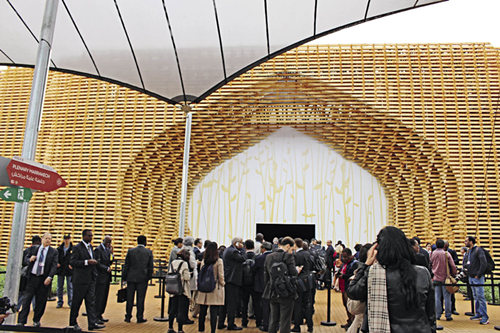The COP of Action – Marrakech Climate Change Conference
China Today by CHEN JING, December 23, 2016 Adjust font size:
THE 22nd Conference of Parties (COP22) to the UN Framework Convention on Climate Change (UNFCCC) took place from 7 to 18 November in Marrakech, Morocco. Meanwhile, the COP12 Kyoto Protocol and COP1 Paris Agreement were also convened. During this 12-day session, participants from more than 190 countries and regions discussed technical details of the Paris Agreement, further promoted its implementation, and formulated a roadmap whereby developed countries fulfill their annual US $100 billion commitment to financial support.

The 22nd Conference of Parties (COP22) to the UN Framework Convention on Climate Change (UNFCCC) took place from 7 to 18 November in Marrakech, Morocco.
The Marrakech Climate Change Conference was the first meeting after the Paris Agreement came into effect. After an appropriate celebration, the COP1 Paris Agreement ensued. Its main focus was on implementing details of the Paris Agreement, advancing from words to action before 2020, climate change funds, and capability construction. Among participants was the Chinese delegation of 80 representatives from relevant departments led by China’s Special Representative on Climate Change Xie Zhenhua and Vice Minister of Foreign Affairs Liu Zhenmin.
Implementation of Paris Agreement
In December 2015, around 200 parties to the UNFCCC signed the milestone Paris Agreement at the Paris Climate Change Conference, so making essential progress in tackling global climate change. This was the second legally binding agreement on the 2020 global action to address and make an effective response to climate change since the Kyoto Protocol adopted on December 11, 1997.
According to the Paris Agreement, the document would come into effect 30 days after 55 UNFCCC contracting parties, accounting for at least 55 percent of global emissions, accept, approve, ratify, and sign the instrument. As the two thresholds were achieved on October 5, the Paris Agreement came into force on November 4, 2016, when the UN Climate Change organizing committee released a press communiqué announcing a celebration. At this historic moment, the communiqué called on all parties to face future realities and the world’s determination to fulfill its mission. This memorable day was described as “the world’s opening of the road to sustainable development and halting of the steps towards climate catastrophe.”
The Marrakech COP22 was a proactive step towards implementation of the Paris Agreement. As Xie Zhenhua said in his address: “Implementing the provisions of the Paris Agreement requires conducting a series of negotiations and making specific arrangements. All parties must work out a schedule, timetable, and roadmap to put the agreement into practice through mechanisms and institutions. This is the main content of discussions at this year’s conference.”
China’s Action on the Paris Agreement
China has made great contributions to bringing the Paris Agreement into effect, and the Chinese government has taken several steps to promote its implementation. Chinese President Xi Jinping delivered a speech on November 30, 2015, titled “Work Together to Build a Win-Win, Equitable and Balanced Governance Mechanism on Climate Change,” in which he said that all parties should be sincere and determined in a concerted effort to establish a fair and effective response mechanism to global climate change, and so achieve a higher level of sustainable development and win-win international relations.
Xi reiterated China’s pledges to peak CO2 emissions by around 2030 and to strive to achieve this as soon as possible, as well as to reduce by 2030 the CO2 per unit of GDP by 60-65 percent over the 2005 level, raise the share of non-fossil fuels in primary energy consumption to about 20 percent, and increase forest stock by around 4.5 billion cubic meters over 2005.
On April 22, 2016, in his capacity of special envoy of Chinese President Xi Jinping, Vice Premier of the State Council Zhang Gaoli attended the high-level signature ceremony of the Paris Agreement at the UN headquarters in New York, and signed the Paris Agreement on behalf of China. Zhang said in his speech titled “Promote Implementation of the Paris Agreement to Establish a Beautiful Homeland for Humankind” that China would try to achieve early implementation of the Paris Agreement, and finalize domestic legal procedures to ratify the pact before the G20 Hangzhou Summit in September this year. The country also pledged to cap CO2 emissions by around 2030 and strive for a peak as soon as possible, and to include these initiatives into the national overall development agenda.
The Chinese government set out in its outline of the 13th Five-Year Plan period to reduce CO2 per unit of GDP by 18 percent in the coming five years. The nation will carry out dual control of total energy consumption and intensity, conduct the initiative to demonstrate near-zero carbon emissions zones, build a national carbon trading market, significantly increase forest carbon sinks, and establish a solid foundation for the Intended Nationally Determined Contributions (INDC). It will also deepen South-South Cooperation on climate change, launch new cooperative fund programs, and help other developing countries to expand their financial capacity sufficiently to respond to climate change.
On September 3, 2016, shortly before the opening of the 2016 G20 Summit in Hangzhou, Chinese President Xi Jinping and U.S. President Barack Obama successively handed over their countries’ instruments of joining the Paris Agreement to UN Secretary-General Ban Ki-moon. Xi Jinping said that climate change has a bearing on people’s well-being and the future of humanity, and that the Paris Agreement pointed the way to global cooperation on climate change beyond 2020, signifying that a win-win, fair and reasonable climate governance system is being formed. China has made great contributions towards promoting this progress. Xi spoke of China’s initiative in suggesting the first presidency statement on climate change in G20 history, and how the country also took the lead in signing the Paris Agreement. Handing over its instrument to UN is China’s solemn commitment to the world.